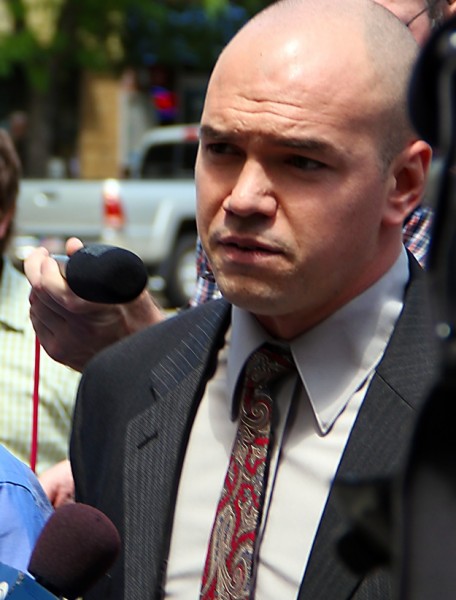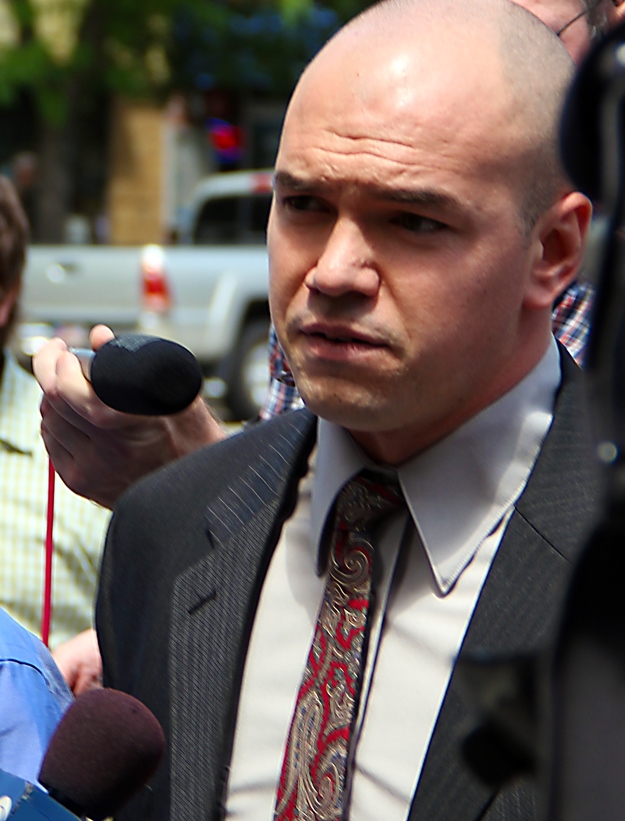Deprecated: Function get_magic_quotes_gpc() is deprecated in /hermes/bosnacweb08/bosnacweb08bf/b1577/ipg.rifuturecom/RIFutureNew/wp-includes/formatting.php on line 4387

Tim DeChristopher spent 21 months in prison after disrupting a Bureau of Land Management oil and gas auction in 2008 by outbidding oil companies eager to snatch up pristine lands around national parks in Utah. Now he’s a divinity student at Harvard. When asked “How did prison change you?” DeChristopher offers a surprising answer:
“It taught me to believe in evil.”
DeChristopher delivered a sermon about his imprisonment and subsequent revelation at the First Unitarian Church of Providence Sunday morning. He began by telling a story about an incident that occurred about six months into his incarceration.
A man named Alejandro was serving time for drug smuggling. Like many inmates, Alejandro turned to crime because of lack of opportunity and a need to provide for his family. During visiting hours, Alejandro was met by his wife, infant child and four year old son. When it came time for visiting hours to end, Alejandro’s son did not understand why his father could not come home with him. He clung to his father and cried until a guard intervened and help Alejandro’s wife physically remove the boy.
“We were all fighting back tears,” said DeChristopher, “All were crying, except for the guard, his eyes were dry.”
The guard was merely inconvenienced.
The guard’s job is to literally tear families apart says DeChristopher, “To do this, you must see inmates as less than human.”
“Evil,” says DeChristopher, “is the denial of the inherent worth and dignity of other people. This is that nature of the prison system today.”
The evil is structural, not personal, and prisons are always evil, even if they are only the lesser of two evils.
The private prison company lobbyists who write the laws that help imprison people for nonviolent crimes don’t have to separate children from their mothers and fathers. Judges, lawyers and juries don’t have to pull children away either.
“Those most impacted [by the system] can do the least about it,” says DeChristopher.
A guard must suppress his conscience, “or find another job” if possible. Most of the guards that DeChristopher dealt with were former military: uneducated and sometimes dealing with mental illness, “practiced in the ways of dehumanization.”
The “suppression of humanity in others goes hand in hand with the suppression of one’s own humanity,” says DeChristopher. The constant belittling of prisoners seemed rote, like programming, and DeChristopher began to see the guards as machines. He told a fellow inmate, “Think about the guards as robots, so you don’t expect anything from them.”
Well after prison, DeChristopher realized, that like the guards, he had denied the basic humanity of those around him. For a Unitarian Universalist, respecting the inherent worth and dignity of all human beings is the first of seven principles. But rather than see his lapse as a failing, DeChristopher sees the principles as aspirational.
Structural Evil
“Structural evil requires a structural response,” says DeChristopher. He thinks people can push back against unjust laws and unjust systems by refusing to convict when we sit on juries if the law or the application of the law will result in injustice. Many courts will tell juries that they must not use their conscience, but only decide cases on the law. DeChristopher maintains that to do this only concentrates power in the hands of judges and prosecutors.
“We need more conscience, more compassion… laws that put non-violent offenders in prison for decades are largely out of line with our values,” says DeChristopher, “Society is alienated along class and race.”
To combat dehumanization, we must find our vulnerability, sacrifice our privilege, and see the inherent worth and dignity in others. There is, says DeChristopher, “a divine spark in each of us” that is “a powerful creative force for combating structural evil.”
But this isn’t easy to do. “Three years after my release, I still don’t think that I could have been strong enough to be vulnerable,” says DeChristopher.
You listen to DeChristopher’s sermon here.


